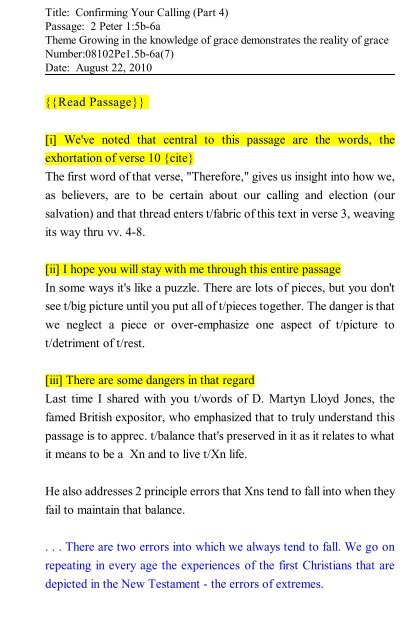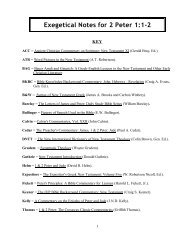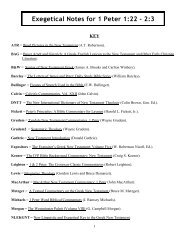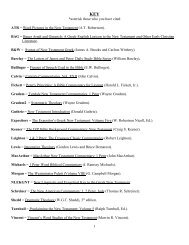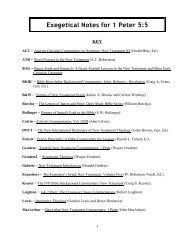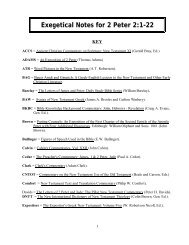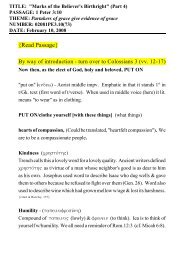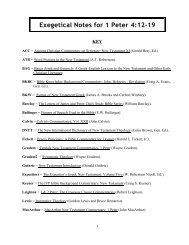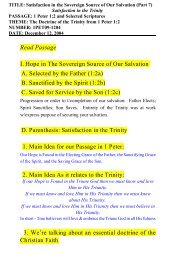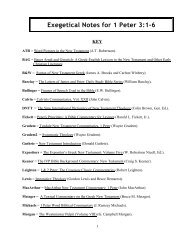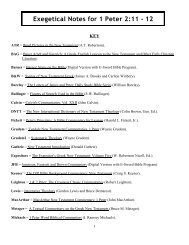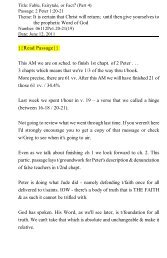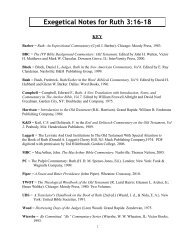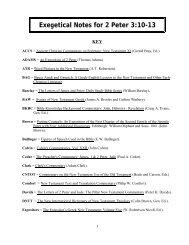2 Peter 1:5b-6a - Tony Bartolucci Dot Com
2 Peter 1:5b-6a - Tony Bartolucci Dot Com
2 Peter 1:5b-6a - Tony Bartolucci Dot Com
- No tags were found...
You also want an ePaper? Increase the reach of your titles
YUMPU automatically turns print PDFs into web optimized ePapers that Google loves.
Title: Confirming Your Calling (Part 4)Passage: 2 <strong>Peter</strong> 1:<strong>5b</strong>-<strong>6a</strong>Theme Growing in the knowledge of grace demonstrates the reality of graceNumber:08102Pe1.<strong>5b</strong>-<strong>6a</strong>(7)Date: August 22, 2010{{Read Passage}}[i] We've noted that central to this passage are the words, theexhortation of verse 10 {cite}The first word of that verse, "Therefore," gives us insight into how we,as believers, are to be certain about our calling and election (oursalvation) and that thread enters t/fabric of this text in verse 3, weavingits way thru vv. 4-8.[ii] I hope you will stay with me through this entire passageIn some ways it's like a puzzle. There are lots of pieces, but you don'tsee t/big picture until you put all of t/pieces together. The danger is thatwe neglect a piece or over-emphasize one aspect of t/picture tot/detriment of t/rest.[iii] There are some dangers in that regardLast time I shared with you t/words of D. Martyn Lloyd Jones, thefamed British expositor, who emphasized that to truly understand thispassage is to apprec. t/balance that's preserved in it as it relates to whatit means to be a Xn and to live t/Xn life.He also addresses 2 principle errors that Xns tend to fall into when theyfail to maintain that balance.. . . There are two errors into which we always tend to fall. We go onrepeating in every age the experiences of the first Christians that aredepicted in the New Testament - the errors of extremes.
There are those . . . who think that by their own efforts they can makethemselves Christian, that by adding these virtues to their natural life [i.e.vv. 5-7] they can fit themselves to stand in the presence of God. And onthe other side there is the error of passivity. This is the error of saying,'Of course one can do nothing; salvation is of Christ; and therefore anyeffort . . . to discipline the Christian life, is wrong, and means fallingback on works, and trying to justify oneself by works.' To go to oneextreme or the other has always been the tendency, and you have thesetwo errors described in the New Testament itself. On the one side thereare those who preach justification by works, and on the other those whocan be described as antinomians, and who say, ' If you are saved. youare saved, and your actions do not matter at all.' These are in bothinstances contradictory to the teaching of Scripture, and upset thebalance of its teaching.His advice? ==>Let us, then, follow the logical order and sequence that are indicated bythe Apostle." [Lloyd-Jones, 23-25]So we need to fasten our minds to how this passage unfolds so that we,like t/bicyclist on t/trapeze line, stay balanced.To borrow that metaphor ==> you know that a trapeze artist gen.carries a balancing pole as he walks across the tight rope. Key wordthere is balance. You don't want a stick that weights 3 lbs on 1 end & 10on t/other. You want balance.[iv] After all, we're talking about some difficult topicsGod's choosing t/believer/His sov. & t/prof. Xn making his election sure.Salvation wholly by grace & t/diligence required to enter t/eternal KD.Assurance of salvation vs. Doubt & despair.Page 2 of 18
The key is understanding that it all begins with God's grace & continuesin t/grace God supplies.This is our first main point ==>I. Salvation's Sufficiency: The Believer's Inheritance (3-4)A. An Inheritance Granted by Grace (3)[It is by Christ's] divine power [that we have been granted] everythingpertaining to life and godliness through the knowledge of Him whocalled us by His own glory and excellence.That t/Xns inheritance has been given to him & that it's based onknowing X, something that God does by His sovereign calling all pointsto the fact that all of our salvation is grounded in grace.II. Salvation's Service: The Believer's Faithfulness (5-9)We're talking in terms of being "fruitful." Cf. v. 8.A. We talked about how this passage unfolds – note the connection(how verse 5 begins)Now for this very reason also . . .Points back to verses 3-4. IOW - We see our responsibility to be diligent& to exercise virtues like moral excellence, knowledge, self-control,love– But those virtues have to spring from a heart transformed by graceor all we're talking about is religion."For this very reason also" ==> Because Xt has given you everythingthey need for life and godliness // He called you to life while you weredead in your sin // He made you a partaker of t/divine nature ==>Now for this very reason also, apply all diligence [in your life]Page 3 of 18
B. While verse 5 points backward it also looks forwardYes, God has lavished upon us His grace. Yes, our standing, our hopeof salvation is totally by grace apart from any works or self-effort. Yes,God has given to us all things that we need for life and godliness. Yes,He has given us his precious and very great promises, joining us with Xthat we might escape the world's corruption.BUT - We still have work to do! We're in a battle. It's not time to relax// rest. We have to be diligent.We are coming up to the 40 year anniversary of an incredible story thatoccured off the coast of FL. Labor Day weekend, 1970 Glenda Lennonand her husband Robert were vacationing in their 21 foot yacht in theGulf of Mexico. They were just 2 miles off shore and Glenda decided togo for swim.She was doing some spearfishing and after 20 minutes or so she beganto swim back to the boat which was only 15 or 20 feet away from her.She noticed she wasn't getting any closer; in fact, the boat was furtheraway. Terrified, she realized she was being swept away to open sea.She called to her husband, a championship swimmer in school: ''Robert,I'm not going anywhere.''He jumped in after her, but by the time he reached her the current hadgotten stronger, pulling them both farther out into the gulf. He decidedto swim back and get the boat and come back around to pick up hiswife. He told her to stay calm, just keep treading lightly, and everythingwould be OK.Page 4 of 18
The current had gotten so strong that it took him over 6 hours to reachthe boat.By this time, the sun had set. He turned the boat toward where hethought she would be, but he could not locate his wife.It was the next day that a search party found her 20 miles away – herskin was blistered and raw from the sun and salt, but she was alive.She later said that the water underneath her was only 8 feet or so deep.She said, ''I could always see the bottom but I didn't go under."[http://articles.orlandosentinel.com/1990-09-02/news/9009010609_1_glenda-stay-afloat-boat-moving]Years ago John Piper used this true story as an example. He says,"What it illustrates is this: Christians who just float never stay in thesame place. Christians who disobey verses 5-7 and do not applythemselves with diligence to bear the fruit of faith drift into great peril.We must strive even to stand still, the tide of temptation is so strong.""The Christian life is very much like climbing a hill of ice. You cannotslide up. You have to cut every step with an ice ax. Only with incessantlabor in cutting and chipping can you make any progress. If you want toknow how to [fall away], leave off going forward and you will godownward by necessity. You can never stand still." [C.H. Spurgeon]Now for this very reason also, apply all diligence . . . The verb occurs only here in N.T., & Lit. means, 'tobring alongside of." That is, bring diligence to bear alongside of God'spromises.Page 5 of 18
We could look at it this way ==>God multiplies Grace and Peace (v. 2); to that grace, to that peace,t/Christian applies hard work, discipline, diligence.Implies significant effort.Josephus (Ant. 11.8.4 §324) writes that Sanballat [Governor of Samariaduring t/time of Nehemiah] "brought all his energy to bear [ ] and built the temple."We persevere, we discipline ourselves, even tho it's all of God's grace.Colossians 1:29 ". . . I labor, striving according to His power thatmightily works within me."Now for this very reason also, applying all diligence, IN YOURFAITH SUPPLY . . .II. Salvation's Service: The Believer's Faithfulness (5-9)What follows from vv. 5-7 are 7 virtues ==>A. Faithfulness Demonstrated Through Seven Virtues (5-7)I want you to note that faith isn't one of the virtues. Some commentatorsI read claim faith as one of t/virtues & list 8 of them, rather than 7.Faith isn't one of t/virtues ==> t/virtues are born out of faith.This is a subjective use of faith, as opposed to an objective use. Sameword used in 1:1. Faith as the action of believing in the truth.Could be understood in the sense of "faithfulness" or "reliability"Hence our second main point ==>Page 6 of 18
II. Salvation's Service: The Believer's Faithfulness (5-9)That faithfulness is born out of God's power and grace. We don't seekto be a Xn by being godly. We live godly because we are born again.. . . in your faith SUPPLY [these things] . . .Supply is a better translation that "add." To supply something impliesthat you have it. To "add" something may be understood that you haveto go get it first. Remember, <strong>Peter</strong>'s emphasis is on t/fact that, as abeliever, you do have these things. They're in your arsenal.If they are lacking, don't go to yourself (you have nothing) / / Go tot/source, go to JC.In his comments on this text, John Calvin, writes about this ==>"Scripture . . . testifies also that all our progress and perseverance arefrom God. . . . [I]t expressly declares that wisdom, love, patience, arethe gifts of God and the Spirit. When, therefore, the Apostle requiresthese things, he by no means asserts that they are in our power, but onlyshews what we ought to have, and what ought to be done. And as to thegodly, when conscious of their own infirmity, they find themselvesdeficient in their duty, nothing remains for them but to flee to God foraid and help." Essential point.<strong>Peter</strong> chooses a word here that paints a lovely picture.The word "supply" (in your faith supply) is t/verb . It's fromt/noun.Page 7 of 18
In t/Greek culture of <strong>Peter</strong>'s day one of the main forms of massentertainment was attending plays. Much like today's Broadway Play,stthese 1 c. dramas were lavish affairs.I was in one play as a child. It wasn't very lavish. It was a Xmas play. Iwas very excited when I was told that I got to play t/part of Rudolpht/rednosed reindeer. That was like getting a lead part. The part came w/acostume. Interestingly, t/costume was for 2 ppl. not 1. I was crushedwhen Rudolph's costume head was handed to Jimmy Guido. In turn, Iwas given t/back part of t/suit & performed before t/massses asRudolph's posterior. I could just see mom and dad out there int/audience, pointing to Rudoph's rear quarter saying, "That's our boy!"stThese plays in 1 c. Greek were not like those of a child. They werelavish, opulent.Generally, they were musical as well. A huge part of t/Greek play wast/Chorus. No expense was spared to equip these choruses.Barclay writes, for example, that ==>[in] the city Dionysia there were produced three tragedies, five comediesand five dithyrambs [poetic performances]. Men had to be found toprovide the choruses for them all, a duty which could cost as much as3,000 drachmae. [Barclay, 298-99]For many at that time, 1 drachma was = 1 day's wage.Each of these choruses had a supplier/benefactor whose responsibilitywas to furnish whatever was necessary to make t/chorus a success.This individual was known as t/.Page 8 of 18
Barclay goes on to say ==>[This] word has a certain lavishness in it. It never means to equip in any. . . miserly way; it means lavishly to pour out everything that isnecessary for a noble performance. Epichorēgein went out into a largerworld and it grew to mean not only to equip a chorus but to beresponsible for any kind of equipnment. It can mean to equip an armywith all necessary provisions; it can means to quip the soul with all thenecessary virtues for life. But always at the back of it is this idea of alavish generosity . . ." [Barclay, 298-99]What did we see in verse 3?Seeing that His divine power has granted to us everythingpertaining to life and godliness . . .Remember, I said that t/word "granted" (has t/idea great generousity. That we could say ==>. . . His divine power has 'lavished upon us' everything pertainingto life and godliness . . .God lavishes us by His grace everything we need to live t/Xn life tot/fullest. In turn, we lavishly supply to our faith things like excellence,knowledge, perseverance, and love.<strong>Peter</strong> is urging you to lavishly equip your life w/these things.What things? Specifically, there are 7 qualities listed here.II. Salvation's Service: The Believer's Faithfulness (5-9)A. Faithfulness Demonstrated Through Seven Virtues (5-7)Or ==> 7 virtues supplied to faith.Page 9 of 18
One last point before we get into them . . .In vv 5-7 <strong>Peter</strong> uses a literary device known as sorites ().Sorites is an argument formed by taking t/predicate from one statementand making it the subject of the next.<strong>Com</strong>mon in Jewish Literature. Example from the Mishnah:“Heedfulness leads to cleanliness, and cleanliness leads to purity, andpurity leads to abstinence, and abstinence leads to holiness, and holinessleads to humility, and humility leads to the shunning of sin, and theshunning of sin leads to saintliness, and saintliness leads to the gift of theHoly Spirit, and the Holy Spirit leads to the resurrection of the dead.”(M. Sotah 9:15)Ladder or chain of virtues.We have a step by step chain that culminates in a climax, t/top oft/laddar (t/pinnacle here in 2 <strong>Peter</strong> is "love" v. 7).Keep in mind that this doesn't imply that each of these virtues has to bemastered before you can go on to t/next.This isn't like, "first I have to take basic arithmetic, then I can takeGeneral Math, then I can go on to Algebra."This isn't a wooden linear progression as much as it is a literary devicefor emphasis.We have a chain of 7 virtues that serve to confirm one’s calling.1. Moral Excellence (5)Page 10 of 18
Now for this very reason also, applying all diligence, in your faithsupply moral excellence . . .a. An uncommon word in the NT, it was used among the Greeks to referto high virtue. An all encompassing virtuous life that lacked hypocrisy"Excellence in character shown in generousity toward others."(1) The word is only used 4x in the NT — 3 of the 4 by <strong>Peter</strong>It's used in 1 <strong>Peter</strong> 2:9 ==> to proclaim His excellencies"It's used 2x here in our passage. We saw it ni v. 3God called us by His glory and excellence.Here, we supply excellence.So this is a characteristic or an attribute of God. "Excellence."Where do we get it?What does verse 4 say? ('partakers of t/Divine Nature').You, as a follower of JC are to be demonstrating ==>"Excellence in character shown in generousity toward others."2. Knowledge (5). . . and in [your] moral excellence knowledge;a. We already saw the word "knowledge" in verses 2 and 3Grace and peace be multiplied to you in the knowledge of God andof Jesus our Lord.Page 11 of 18
Just as His divine power has granted to us everything pertaining tolife and godliness through the knowledge of Him who called us byHis own glory and excellence.1:8. 2:12 ==> false teachers had no true knowledge.Growing in the knowledge of grace demonstrates the reality of grace.We need to be learning, yes; but we need to go beyond learning toknowing. This is t/kind of knowledge that impacts t/heart.Howard Hendricks ==>"When I was youth director in a church in Illinois, a boy in the juniordepartment had memorized six hundred verses word perfectly. We evenhad him on a Christian radio program and tested him on the air.Later we were told someone apparently was stealing money from thejunior-department offering each Sunday. A committee was appointed toinvestigate, and--you guessed it--the kid who knew the six-hundredverses was the culprit. I called him into my office and repeated to hima verse of Scripture (which, by the way, he told me I misquoted). I said,‘Do you see any connection between that verse of Scripture and yourstealing from the offering?’ ‘No,’ he said at first. And then, ‘Well,maybe there is.’ ‘What do you think is the connection?’ ‘I got caught,’he said." [Howard Hendricks, Teaching to Change Lives, 95]I hate t/fact that there is so much theological and biblical ignoranceamong Xns. That can be remedied; they can be taught.But I'm weary of those who call themselves believers in JC (implies thatthey're followers of X) who have full minds & empty hearts.Page 12 of 18
Those who can nod their heads up and down in agreement about t/graceof salvation, and yet demonstrate so little of that grace in their own lives.Who can so readily see t/sin in others and yet are blind to their own.. . . in [your] moral excellence [supply] knowledge;Gaining in knowing about God through His Word is part of it, but itgoes beyind that in a personal, intimate knowledge that flowers intoactions and attitudes that honor Christ.In 2 Tim. chapt. 3 Paul talks of those who have a form of godliness, butwho deny t/power of godliness. He further describes them as alwayslearning but never coming to the knowledge of t/truth.We need to be about learning. Implicit in t/word for disciple ).A disciple is a learner. R hearts/minds must be saturated w/Script. &S.D. We need to be learning more & more about JC & our doctrineshould resonate w/His sovereign glory. That devotion, if it's real/alivewill flower into prayer, worship, and a knowledge that transcendst/stubborn barrier that so often lies between our heads & our hearts.Be in t/Word. Read it. Meditate on it. Prayer over it. Read good booksby gifted, godly men. Draw from t/resources of t/CH. Bible studies,times of prayer. Cherish t/preaching of God's Word as an opportunity tohear t/very voice of God. But please, don't be hearers only; be doers.This knowledge is so essential that <strong>Peter</strong> lit. bookends this letter w/it.(cf. v. 2, 3, 5; cf. 3:14-18).3. Self control (6). . . and in [your] knowledge, self control . . .Page 13 of 18
Self-discipline. Think about those 2 words – and think about your life.Does your life demonstrate self control or is it out of control?Here is a key to knowledge // here is a key to godly living ==>Discipline. Again, t/word "disciple" implies "disipline". If you desire tobe a disciple of JC you have to desire discipline & apply self-control toyour life.If knowledge is t/rudder that directs t/ship; self-control is t/engine thatmoves it.Years ago I came upon this book, "Self Discipline in 10 Days." Ithought it would be humorous to write an online review of t/book,simply saying, "I like t/concept, but I wasn't disciplined enough to readit. Is there a prequel, something like "1 Step to gaining t/self-disciplineto read t/book, S.D.in10Days?"I always think of this illustration ==>Euclid, t/famous Greek mathematician, wrote a 13 volume text for thestudy of geometry. But Ptolemy I, King of Egypt, wanted to learn thesubject without having to study so many books. As a king, he wasaccustomed to having his way made easy, so he asked if there was ashortcut to mastering geometry. Euclid's reply to t/king was "No, thereis no royal road to learning." [cited in Whitney Spiritual Disciplines, 223]The fact of t/matter is, there's no royal road to self-discipline; no quickand easy tricks; you learn it by doing it.We want t/quick & easy. But t/word "discipline" doesn't imply ease.Page 14 of 18
It is expected that this year alone, Americans alone will spend over 60billion dollars in an attempt to lose weight. A few years ago I came upw/a simple diet plan ("physician, heal thyself – take t/anchovy pizza outof your own mouth, then you will be fit to remove t/cheeseburger frommine") ==> ELF EMO diet plan.The Greek word is (stem of t/word - κρατ - is a word forpower or might). Self mastery. To exercise dominion over one’s desiresand actions. Idea is that if you can be self-controlled in what you desire,you will enjoy mastery over what you do or don't do.In t/context here, it's to be disciplined over those 'lusts' that we, aspartakers in t/Divine Nature, are to have escaped.This noun is also in Acts 24:25, & Gal. 5:23 (FOS).Verb is used in 1 Cor. 9:25.. . . everyone who competes in the games exercises self-control in allthings. They then do it to receive a perishable wreath, but we animperishable.Loew & Nida's Gk Lex. entry on this word ==>An adequate rendering of the expression ‘to exercise self-control’ mayrequire an idiomatic equivalent, for example, ‘to hold oneself in,’ ‘tocommand oneself,’ ‘to be a chief of oneself,’ ‘to make one’s heart beobedient,’ ‘to command one’s own desires,’ ‘to be the master of whatone wants,’ or ‘to say No to one’s body.’In the LXX is used in Gen. 43:31 to describe Joseph’scontrol of his emotions towards his brothers ("he controlled himself").Page 15 of 18
I mentioned that the word was used in Acts 24:25. That's an interestingcontext.TAP is accused by t/Jews of bringing a Gentile into t/Temple (punishableby death). He's arrested by t/Romans & brought before t/Sanhedrin.From Jerusalem he's taken to Caesarea where he stands trial beforet/Roman Governor Felix. We read in 24:25 ==>[That as Paul] was discussing righteousness, self-control(), & the judgement to come, Felix became frightened..."Many scholars believe that, contextually, his fear is directly connectedto the word (self-control). Why? Was he lazy? His wife,Drusilla, was next to him. Did she have a "honey do" list that he keptignoring? Maybe he was afraid of her?!No, this word was frequently used of self-control as it relates to moraland sexual purity.Felix, a Gentile, and Drusilla, a Jew were married. But not lawfully.The Roman historiographer Suetonius records that Drusilla was Felix's3rd wife. She also had her share of husbands.Most recently, she had left Azizus a king in northern Syria, whom shehad married at 14. She left him to become the wife of Felix.One commentator writes ==>"Since an adulteress sat beside Felix while Paul discussed self-control,its bearing on unchastity is easily apparent, and the verse comparesrdnaturally with 1 Cor. 7:9." [The New Bible Dictionary, 3 Ed]Page 16 of 18
1 Cor. 7:9, Paul, after stating that it is good to remain unmarried ==>But if they [unmarried and widows] do not have self-control, let themmarry; for it is better to marry than to burn.. . . applying all diligence, in your faith supply moral excellence, in[your] moral excellence knowledge, and in [your] knowledge, selfcontrol . . .In saying this, <strong>Peter</strong> continues to take aim at t/false teachers who wereanything but self-controlled.They practiced sensuality (2:2)They had eyes full of adultery (2:14)Entangled in the defilements of the world (2:19).They were anything but those who had escaped the corruption in theworld by lust, because they were never partakers of the divine nature.Partakers of grace give evidence of grace. This is making sure yourcalling and election. This is ==>II. Salvation's Service: The Believer's Faithfulness (5-9)One of the most tragic events during the Reagan Presidency was theSunday morning terrorist bombing of the Marine barracks in Beirut.100s of Americans were killed or wounded as they slept.Page 17 of 18
Marine Corps <strong>Com</strong>mandant Paul Kelly visited some of the woundedsurvivors who had been shuttled to a hostpital in Frankfurt, Germany.Among them was Corporal Jeffrey Lee Nashton, severely wounded inthe incident. Nashton had so many tubes running in and out of his bodythat a witness said he looked more like a machine than a man; yet hesurvived.As Kelly neared him, Nashton, struggling to move and racked with pain,motioned for a piece of paper and a pen. He wrote a brief note andpassed it back to the <strong>Com</strong>mandant. On the slip of paper were but twoLatin words—“Semper Fi” – the Marine motto, “forever faithful.”[Adapted from 'Children at Risk,' J. Dobson & Gary Bauer, Word, 1990, pp. 187-188]Should that not be t/motto of the Xn? "Forever faithful?"I'd be t/first to admit that we fall short, sometimes far short. But we stayin t/battle. That is our desire.To hear our Lord say to us ==>‘Well done, good and faithful slave; you were faithful with a few things,I will put you in charge of many things; enter into the joy of yourmaster.’Page 18 of 18


